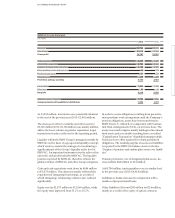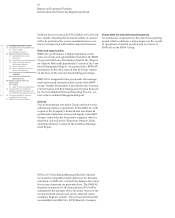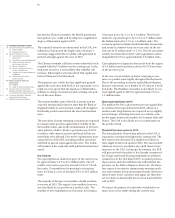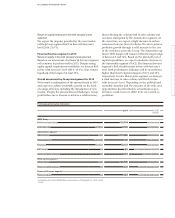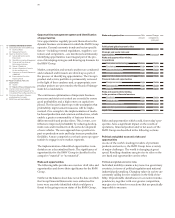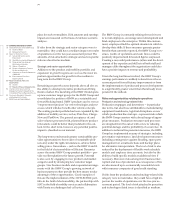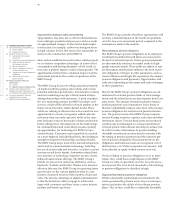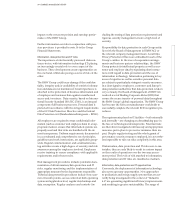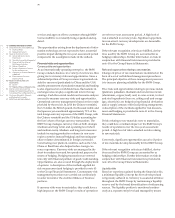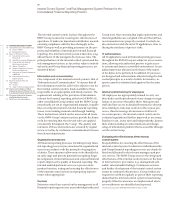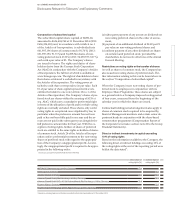BMW 2014 Annual Report Download - page 73
Download and view the complete annual report
Please find page 73 of the 2014 BMW annual report below. You can navigate through the pages in the report by either clicking on the pages listed below, or by using the keyword search tool below to find specific information within the annual report.
73 COMBINED MANAGEMENT REPORT
The current high level of volatility prevailing in many
economies continues to have an unsettling impact on
markets and consumers. Many emerging economies are
currently performing below their full potential. The
euro zone is still having to cope with a range of structural
problems, such as those evident in Greece.
The slowing of economic growth in China, one of the
BMW Group’s principal markets, also continues to pose
a major risk. Upheavals in the property or banking sector
in this region could result in reduced demand for our
products and services.
Any escalation of political conflicts (such as in Russia),
terrorist activities, natural disasters or possible pan-
demics
could have a negative impact on the world econ-
omy and international capital markets. The BMW Group
counters these risks primarily by internationalising its
sales and production structures, in order to reduce the
potential impact of risk exposures in individual coun-
tries. Political and global economic risks are determined
by analysing historical data and applying a cash-flow-at-
risk approach.
If risks from this category were to materialise, they
could – due to sales volume fluctuations – have a high
impact on results of operations over the two-year as-
sessment period. Overall, the risk amounts attached
to political and global economic risks are classified as
high.
Political and global economic opportunities
Despite the high level of risk involved, the BMW Group
sees an opportunity for above-average growth in the
Chinese market. In addition to the impact from eco-
nomic developments, the BMW Group’s earnings can
also be positively affected in the short to medium term
by changes in the legal environment. A possible reduc-
tion in tariff barriers, import restrictions or direct ex-
cise
duties could lower the cost of materials for the
BMW Group, also enabling products and services to be
offered to customers at lower prices. Another factor to
consider is that regulatory support for forward-looking
technologies, such as electromobility, help to make
the total cost of ownership more attractive for customers
in the form of incentives. Developments of this kind
open up opportunities to achieve faster market penetra-
tion for these technologies, which could, in turn, lead
to higher sales volumes and, all other things being equal,
result in an improved quality of earnings. Changes in
the legal environment are monitored continuously at a
centralised level. At present, however, the BMW Group
does not see any significant political and / or global eco-
nomic opportunities, which could have a positive sus-
tainable impact on its earnings performance.
Strategic and sector risks and opportunities
New regulations and the development of fuel and energy
prices also influence various aspects of our business,
including customer behaviour. Medium- and long-term
targets have already been put in place in Europe, North
America, Japan, China and other countries to minimise
fuel consumption and CO2 emissions.
Strategic and sector risks
One of the main risks for the automobile industry is
the possible threat of short-term tightening of laws and
regulations, including local registration restrictions. In
some cases, changes in customer behaviour are not only
brought on by new regulations, but also through changes
of opinion, values and environmental issues. Among
other factors, global climate change is having an effect
on legislation, regulations and consumer behaviour. In
order to meet structural changes in the demand for
individual mobility that no longer necessarily entail
actually owning a vehicle, the BMW Group is offering
corresponding mobility services, such as the DriveNow
car-sharing model.
With its Efficient Dynamics concept, the BMW Group
is playing a pioneering role in the premium segment in
reducing both fuel consumption and emissions. With
effect from 2013, our range of products was expanded
to include electric powertrains in BMW i series vehicles.
These innovations also make an important contribution
in our endeavours to fulfil statutory rules and
require-
ments in terms of CO
2
emissions. The BMW Group is
investing in the development of sustainable drive tech-
nologies and materials, with the aim of providing highly
efficient vehicles for individual mobility in the premium
segment, both now and in the future.
Employees make a vital contribution to sustainable
growth and improved profitability through their inno-
vative skills. One prerequisite for this is a consistent
strategic approach to the management of human
re-
sources, even in the event of changes in the legal frame-
work. The BMW Group has appropriate measures in


